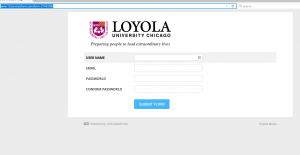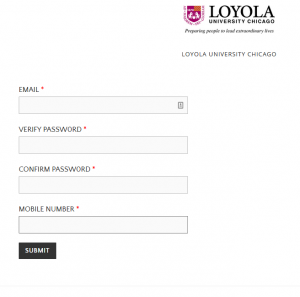This is the latest phishing scam. This is yet another in a series of emails from scammers trying to get your UVID and password. From: Date: Jun 2, 2017 3:20 PM Subject: ITS Alert: E-mail account verification To: Cc: ——————————– Request Confirmation: 65189W5G64H2 ——————————– Date: 06/02/2017 ——————————– Your account has been queued for deletion following […]

LOYOLA UNIVERSITY CHICAGO • March 1, 2026
Loyola Information Security Blog
University Information Security Office
Search
Recent Post
- February 2026 Newsletter: Electronic Gift card Scams are on the rise
- Happy New Year from UISO: Set a Cyber Resolution for 2026
- MFA – Why it matters
- October is National Cybersecurity Awareness Month
- Watch out for “E-Signature” Phishing Scams
Archives
- February 2026
- January 2026
- November 2025
- October 2025
- September 2025
- August 2025
- July 2025
- June 2025
- April 2025
- March 2025
- February 2025
- October 2024
- September 2024
- August 2024
- July 2024
- June 2024
- February 2024
- January 2024
- November 2023
- October 2023
- August 2023
- July 2023
- June 2023
- May 2023
- March 2023
- February 2023
- January 2023
- November 2022
- October 2022
- September 2022
- August 2022
- May 2022
- March 2022
- February 2022
- January 2022
- December 2021
- November 2021
- October 2021
- September 2021
- August 2021
- July 2021
- June 2021
- May 2021
- April 2021
- March 2021
- February 2021
- January 2021
- December 2020
- November 2020
- October 2020
- August 2020
- July 2020
- June 2020
- May 2020
- April 2020
- March 2020
- February 2020
- January 2020
- November 2019
- October 2019
- September 2019
- August 2019
- July 2019
- June 2019
- May 2019
- April 2019
- March 2019
- February 2019
- January 2019
- December 2018
- November 2018
- October 2018
- September 2018
- August 2018
- July 2018
- June 2018
- May 2018
- April 2018
- March 2018
- February 2018
- January 2018
- December 2017
- November 2017
- October 2017
- September 2017
- August 2017
- July 2017
- June 2017
- May 2017
- April 2017
- March 2017
- November 2016
- October 2016
- September 2016
- August 2016
- July 2016
- June 2016
- May 2016
- April 2016
- March 2016
- February 2016
- January 2016
- November 2015
- October 2015
- September 2015
- August 2015
- July 2015
- June 2015
- May 2015
- April 2015
- March 2015
- February 2015
- January 2015
- December 2014
- November 2014
- October 2014
- September 2014
- August 2014
- July 2014
- June 2014
- May 2014
- April 2014
- March 2014
- February 2014
- January 2014
- December 2013
- November 2013
- October 2013
- September 2013
- August 2013
- April 2013
Jim Pardonek

Latest Phishing Email 6/7/17
June 7th, 2017
We continue to receive multiple phishing emails that are attempting to harvest credentials. Please delete this email. If you have responded and entered your credentials, please go to password self service and reset your password or call the LUC helpdesk. The latest email appears as below; Sent: Wednesday, June 7, 2017 04:15 Subject: Upgrade Your […]
Newest Phishing Email
July 10th, 2017
Here is the latest phishing email that has been circulating at Loyola. There are several indicators to look for in this particular email message. First, this email creates a sense of urgency by “warning” you that your account will be deleted. Loyola does not do this. Second, if you hover over the link within “please […]
Latest Phishing Email
May 23rd, 2017
We continue to receive phishing emails from sites created on Weebly. Although we have temporarily blocked access to Weebly from on campus, students, faculty and staff that access their email from off campus are still vulnerable if they click the link and provide their credentials. Loyola University Chicago does not send email account warnings that […]

Multiple Phishing Email
May 4th, 2017
Over the last several days, the university has experienced a number of phishing email attempts that are designed to steal your uvid and password. The general format for these messages is similar to: Dear Luc® Email users! Our web administrator has been notify of some Unwarranted /Unauthorized activities in our Webmail database For these reason […]
FTC Releases Alert on Louisiana Flood Disaster Scams
August 25th, 2016
The Federal Trade Commission (FTC) has released an alert on scams that cite the recent flood disaster in Louisiana. These charity scams take many forms, including emails containing links or attachments that direct users to phishing or malware-infected websites. Donation requests from fraudulent charitable organizations commonly appear after major natural disasters. US-CERT encourages users to […]
Apple Releases Emergency iOS Update
September 1st, 2016
Update Addresses Zero-Day Vulnerabilities Being Exploited in the Wild Apple has released an emergency security update for iOS after it was discovered that three zero-day vulnerabilities were being exploited in the wild. These three vulnerabilities when used together could be used to achieve remote code execution with kernel level privileges. Citizen Labs and Lookout, research firms […]
Fraud Advisory – Discount Tuition Scam
September 19th, 2016
Well organized fraudsters are running a scam using social media and word-of-mouth primarily targeting international students at U.S. colleges and universities. The fraudsters offer discounts on school tuition if the victim makes a tuition payment via the fraudsters. Victims are subsequently asked to provide their credentials to the school’s online tuition payment portal in order […]
CyberSecurity Awareness Month Tip
October 25th, 2016
Lock down your home Wi-Fi network. Your home’s wireless router is the primary entrance for cybercriminals to access all of your connected devices. Secure your Wi-Fi network, and your digital devices, by changing the factory-set default password and username. For more information on CyberSecurity Awareness Month go to www.luc.edu/uiso/ncsam
1.4 Billion Clear Text Credentials Found On The Dark Web
December 22nd, 2017
ITS was recently notified by that several thousand luc.edu accounts were listed as part of the 1.4 billion aggregate database of usernames and clear text passwords that was found in an underground community forum. What is it? As hackers accumulate login and password information from phishing scams and other means, they generally either sell this […]